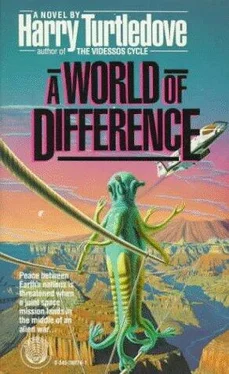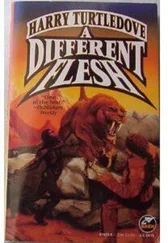“You want what?” the chemist asked when he was on the ground. The Minervans pulled back again at the sound of his deep voice.
Then one of them, visibly gathering his courage, stepped toward Voroshilov again. He repeated the sad chant all three males had been making: “Give! Please give!”
“Here.” Voroshilov pulled out a pocket knife and briefly took off one glove so he could use his thumbnail to pull out a blade and show the male what the artifact was. The Minervan shrieked again, this time, if Lopatin was any judge, in delight.
Seeing their comrade rewarded, the other two males also came up to Voroshilov. He gave one of them another pocket knife, the other a chisel with a transparent gold plastic handle.
“Hot, yellow ice!” the Minervan exclaimed as he held the chisel up to one eyestalk so he could peer through it.
All three males made themselves short and fat to thank Voroshilov and were so happy they did not take fright when he bowed in return; Lopatin had seen other locals start running at what was to them a startling gesture.
As he always did, Voroshilov asked, “What you do with tools I give you?” And Oleg Lopatin, not for the first time, thought the chemist was much more animated dealing with the Minervans than he ever had been with his fellow humans. Voroshilov’s pale, rather thin features lit up; real expression came into his voice.
The answer he got was the one he and Lopatin heard most of the time: “Take them to Hogram’s town to get what we can for them.”
“And after that?” Voroshilov persisted.
Again the reply was familiar. “We hope we will have enough then to pay Hogram the back rent on our plots, so we will not have to give them up and come to the town for good to try to make a living there.”
“Good luck to you,” Voroshilov said. Inside Tsiolkovsky, Lopatin sardonically echoed, “Good luck.” The Minervan peasants would not earn as much as they thought for the trinkets Voroshilov had given them. Too many such goods from Earth were available around Hogram’s castle; almost every day, the Russians there reported another drop in price.
Well, the bumpkins would find that out soon enough. He watched them trudge off toward the town. Each of them kept a couple of eyes trained on Voroshilov as he climbed up into Tsiolkovsky. The locals would have a story for the rest of their lives, Lopatin thought.
“What do you suppose they’ll end up doing a few weeks from now?” he asked when his companion was back inside.
“Building boats,” Voroshilov said promptly.
“I expect you’re right,” Lopatin agreed. “Building boats, earning whatever wages Fralk and Hogram choose to grant them, living wherever they can, with only their labor to sell.”
“Proletarians,” Voroshilov said.
“Exactly so. The revolution will come here one day, just as it has on Earth.”
“Not now,” Voroshilov said with what sounded like alarm.
Lopatin made a mental note of that tone, but only a small one, because Voroshilov was right. The Minervans here were just entering a capitalist economy, not coming to its conclusion. And from what Lopatin had gathered from the Americans’ reports, the natives on the far side of Jotun Canyon were still frankly feudal.
Barring the genius of a Lenin, then, the time for the revolt of the proletariat was still far away. Lopatin had a very good opinion of himself, but he knew he was no Lenin.
“Back to work,” Voroshilov said, and headed off for his lab. A strange one, Lopatin thought as the chemist walked down the passageway. He had had the thought many times and still did not care for it. He wanted-he needed people to be orderly and predictable. Anything he did not understand, he mistrusted.
Voroshilov, for instance, had gone far longer than any of the other men on Tsiolkovsky before even trying to approach Katerina. He had gone so long, in fact, that Lopatin began to wonder if he was a homosexual who had somehow escaped all the screening for that kind of criminal behavior. Lopatin would not have much minded if he was; it would have given him a hold on the quiet chemist. But it was not so. As far as the KGB man could tell, Voroshilov was just painfully shy.
He waited until clanks and clatters told him that Voroshilov was busy again, then called up a computer index to which no one else on Tsiolkovsky had access. In it were his files on the other five crewfolk. He recalled Voroshilov’s. One of the documents was called “Poetry”-it was a transcription of the set of jottings Lopatin had found on one of his periodic searches through the ship. The scribbles themselves were back in their hiding place.
“Love songs,” the KGB man muttered under his breath as he read them again. They were amazingly good, amazingly sensuous, and every one had Katerina’s name in it. Just glancing at them made Lopatin wish she were there. She had not warmed much in his embrace during the brief time she let him share her cubicle, but he still savored the relief her body had brought.
Men were not like women, he thought thankfully, remembering the old joke about the fellow who came into a tavern complaining that the lovemaking he had just had was the worst he had ever known. When the man behind the bar asked him how he would describe it, he grinned and said, “Magnificent!”
Regretfully, Lopatin sent the poems back into the computer’s memory. He also sent a sharp glance back toward where Voroshilov was still working. Nobody with that unprepossessing an exterior had any business having all those fine words running around loose in his head. Lopatin doubted everyone on principle but felt real suspicion of anyone who concealed himself the way the chemist did.
Tried to conceal himself, the KGB man amended. If he ever needed one, he had a handle on Voroshilov, all right. He smiled. Katerina was a very nicely shaped handle, now that he thought of it.
The ball, a hide cover over soft teagfiber, flew past Lamra. She let out a frustrated squawk as she went after it. She had thought she had an arm in the right place to catch it, but somehow it got by her. It usually did.
She widened herself so she could pick up the ball. “Reatur always catches it,” she said. “It’s not fair.”
“Throw it back to me,” Peri said. When Lamra did not throw it back right away, the other mate’s voice got louder. “Throw it back to me! Throw it back to me!” Lamra still did not throw it. Peri came over and took it away from her. “Mine!”
Lamra snatched it back. She used a couple of free hands to hit Peri. She was older and bigger than the other mate, but that did not stop Peri from hitting her, too, and poking her with a fingerclaw. She yelled and threw the ball at Peri as hard as she could. She missed. The ball bounced away.
Neither mate cared about it anymore anyhow. They were too busy fighting with each other. Other mates came running to watch and to add their shouts to Lamra’s and Peri’s.
Lamra had taken control of the fight and was just about to tie three of Peri’s arms into a knot when the door to the outside world came open and Reatur walked in.
“What’s going on here?” he asked. “What’s this racket all about?”
“She took my ball away,” Peri said, squirming away from Lamra and pointing at her with the arms that-too bad! she hadn’t got to knot up after all.
“Not your ball,” Lamra said. She gathered herself to grab Peri again and really give her what for. Reatur turned an extra eyestalk her way and pointed at her with an arm that did not seem to have anything better to do. Regretfully, she subsided. She might have known he would notice.
“Back to what you were doing, the rest of you,” Reatur told the crowd of mates around Peri and Lamra. They went, thoughalmost all of them kept an eyestalk on what was going on. Even so, Lamra wished they would do what she told them to like that.
Читать дальше












